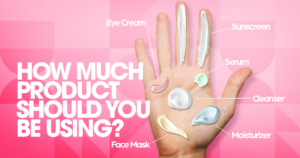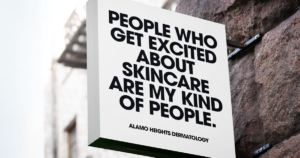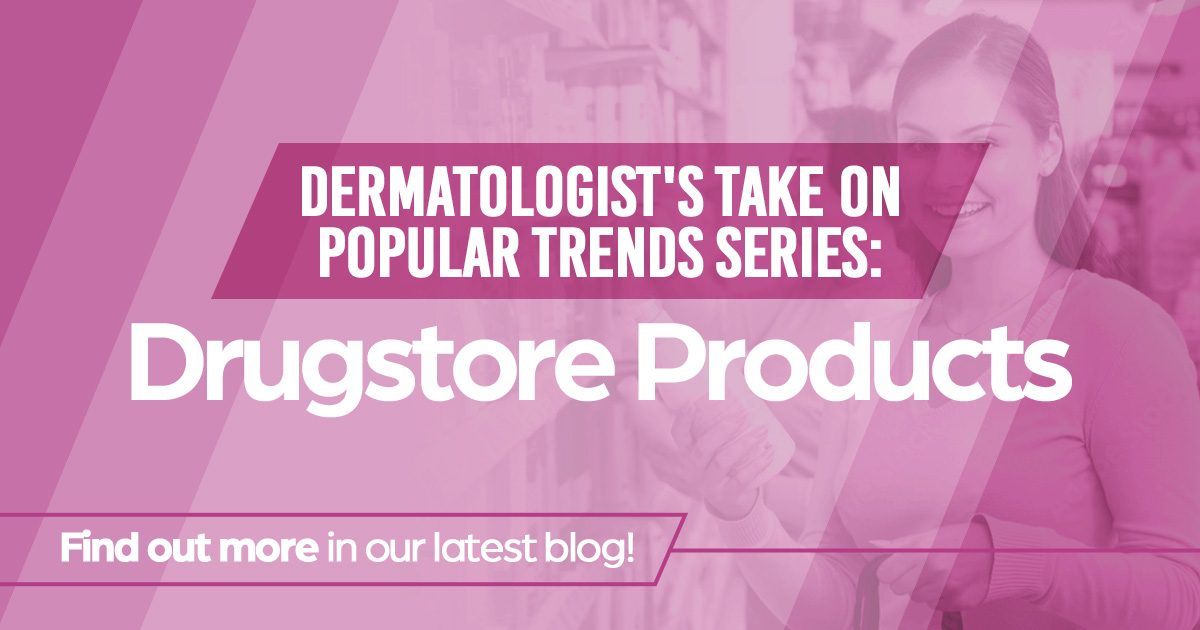In the vast world of skincare, navigating the shelves of drugstore products can feel like embarking on a mysterious journey. With countless brands, ingredients, and promises, it’s easy to get overwhelmed. It’s time to demystify the realm of drugstore skincare products. In this blog, we sit down with our very own Dr. Julie Fridlington to ask the questions that have been on your mind about using drugstore products.
What skincare products are okay to get at a drugstore?
Dr. Julie Fridlington: The drugstore can be filled with lots of wonderful products that don’t break the bank. Cleansers, moisturizers, and sunscreens are some of the most easily accessible drugstore products.
Gentle cleansers: My favorite brands include Vanicream, CeraVe, Cetaphil, and Dove. All ofthese companies make cleansers formulated specifically for facial skin or body skin. I often recommend Dove for Sensitive Skin Beauty Bar, Dove Body Wash Irritation Care, VanicreamGentle Cleanser, CeraVe Hydrating Body Wash, & Cetaphil Ultra Gentle Body Wash.
Facial cleansing: Micellar Water, Neutrogena Hydroboost Cleansing Gel, Vanicream Gentle Facial Cleanser, Cetaphil or CeraVe hydrating or foaming facial cleansers, and for oily skin the Cetaphil Oil Removing facial wash.
Moisturizers: Moisturizers containing ceramides, hyaluronic acid, and glycerin are key to healing and protecting dry skin. Ceramides are waxy molecules that help lock in moisture in the skin and repair the skin barrier are instrumental in preventing and healing dry skin. CeraVeCream is full of ceramides and readily available over the counter. Hyaluronic Acid is an important moisture magnet in our skin that helps hold moisture in our skin and, in turn, lift and plump. The Neutrogena Hydroboost line contains high levels of Hyaluronic Acid as well as the humectant glycerin to pull and hold water in the skin. Glycerin helps attract water without being too oily or heavy.
Sunscreen: Drugstores are the best place to explore different sunscreen vehicles (stick, foam, spray, lotion etc.) and brands. Some of my favorite brands include La Roche Posey Antheliossunscreens, Neutrogena, and Aveeno Mineral sunscreens. Recently, I was introduced to Eucerin Sun portfolio with 5 AOX Shield. These products are quickly becoming some of my favorites as they not only provide sun protection but also have a unique blend of antioxidants to help combat the signs of aging. My personal favorites are the Sensitive Mineral Sunscreen and Sensitive Mineral Tinted Facial Sunscreen, which have a smooth blended appearance on the skin instead of leaving a white residue. The Advanced Sun Hydration contains hyaluronic acid and humectants to help maintain the hydration of the skin while delivering UV protection. We are so lucky to have these new formulations which behave like a “treatment sunscreen” to do more than just block harmful UVA/UVB rays. These are the types of products that really allow consumers to get more bang for their buck.

Are there specific types of products you would avoid buying from a drugstore?
Dr. Julie Fridlington: Consumers need to be careful when buying an antioxidant like vitamin C in the drug store, as not all vitamin C products are created equally. As an antioxidant, vitamin C can help prevent and reverse the signs of aging by helping to produce firmer skin cells, prevent hyperpigmentation, and defend against free radical damage; however, vitamin C can become unstable and oxidize when exposed to heat, light, & air. Once it becomes unstable, it is no longer able to provide protective benefits to the skin or prevent free radical damage. Visually, you could see something like the product turning orange or brown. To ensure the stability of your product, look for dark-tinted bottles with airless delivery systems to help prevent that oxidation process. The goal is to find a stable product between 10%-20% vitamin C to maximize the benefits of vitamin C in the skin while minimizing irritation. CeraVe Skin Renewing Vitamin C Serum is a great choice.
How long do these products typically last before needing replacement?
Dr. Julie Fridlington: My rule of thumb is if a product is still sitting around after a year, it needs to be replaced.
Are there any ingredients one should avoid?
Dr. Julie Fridlington: I often see patients come in who have over-scrubbed, over-exfoliated, or over-processed their skin and are now struggling with irritation and dryness. The problem isn’t necessarily product or ingredient-specific, but more often overzealous usage of products or using too many products at once. For example, stacking a vitamin c/ascorbic acid serum with alpha or beta hydroxy acid product and a retinoid all in the same timeframe can lead to additive irritation. Timing the application of products between AM and PM can be just as important as the ingredients themselves. Because of its ability to protect the skin from UV-induced oxidative damage, AM application of vitamin C is most protective, while acid-based exfoliation products like retinoids/retinols are most effective at PM application.
What are some budget-friendly alternatives or dupes for higher-end products?
Dr. Julie Fridlington: Differin Gel 0.1% (adapalene) is a prescription strength over–the–counter retinoid marketed for the treatment of acne, but can also provide all of the wonderful retinoid cosmetic benefits such as stimulating collagen to minimize fine lines and wrinkles, fade sunspots, and smooth the texture of the skin.
Neutrogena HydroBoost Line: cleanser, moisturizer (face & body) and daily SPF.
The Ordinary (theordinary.com) is a great online resource for skin care products. Azelaic Acid 10% Suspension for acne and pigment correction, Caffeine Solution 5% EGCG for puffy, tired eyes, Glycolic 7% toning solution for light exfoliation to combat dullness and texture irregularities, Vit C suspension for brightening, firming, and free radical protection.
Are there drugstore brands or product lines you recommend?
Dr. Julie Fridlington: Aquaphor Healing Ointment and Vaseline are my go-to products for dry,damaged cuticles, lip care, burns and wound care, and more extreme dryness of the skin.
The Ordinary
La Roche Posey Anthelios sunscreens
Neutrogena HydroBoost
CeraVe

How would you rate drugstore products on the glow-up scale: 0-5?
Dr. Julie Fridlington: Healthy skin can be just as achievable with drugstore products as with high-end products. The key to long-term skin health, regardless of the cost of the product, is consistency. I would rate drugstore products’ glow-up potential as a 5.


